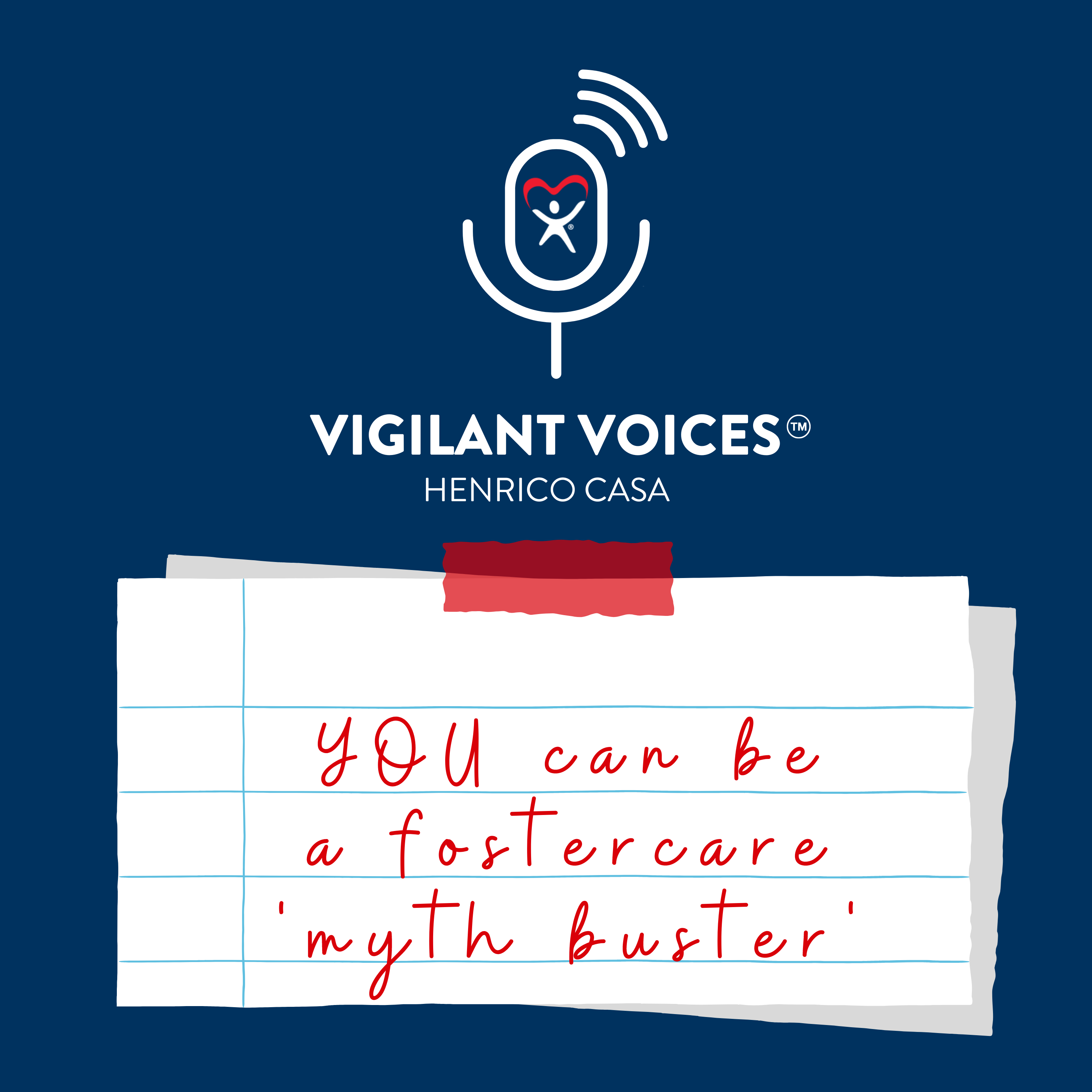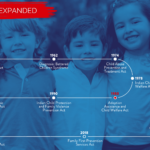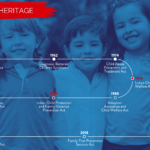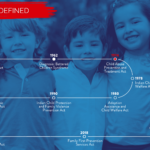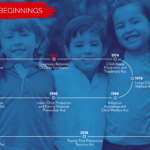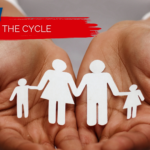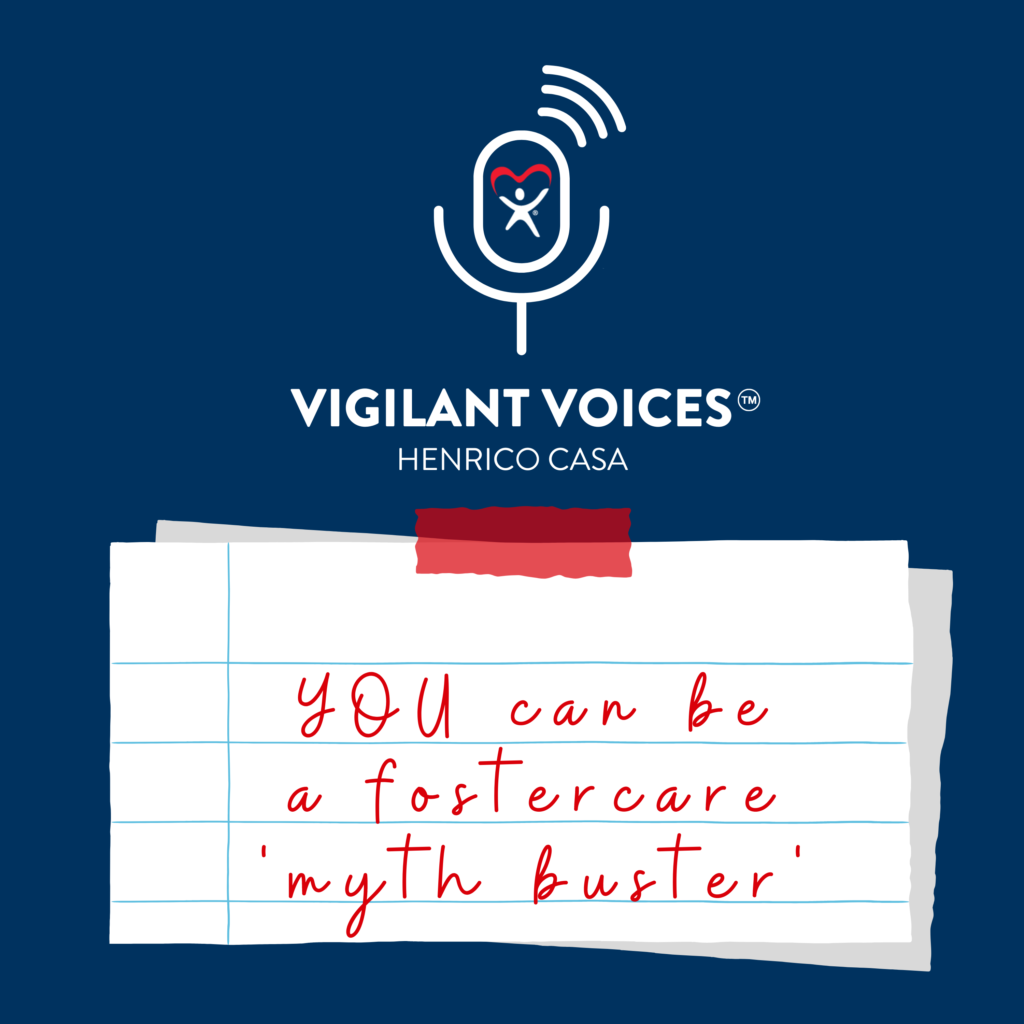
Listen to Episode 5 of the Vigilant Voices™ podcast, You Can Be a Foster Care ‘Myth Buster.”
Kristin Blalock: Oh, Jeannine, I can’t believe this is already our fifth episode.
Jeannine Panzera: Seriously? A reminder to you listener, that in our work at CASA, we’ve learned that it’s important to know about the challenges facing children and families to ensure that no child faces abuse, neglect, or trauma. And that’s what our podcast is all about.
K: It is. And when we are talking about childhood maltreatment, the discussion often includes, and I think our brains sort of go to, the foster care system because the purpose of foster care is to be a reprieve for children from what was an unsafe living condition.
J: Right. So the intent is to move the children into what the Department of Social Services has deemed to be a safe environment. And we should remind ourselves that some synonyms for foster is ‘stand in, substitute, be temporary, or short term.’ So while this fostering happens, long-term solutions are being formulated.
K: Yes, 100%. Foster care is meant to be a short term arrangement that benefits the child. But for sure, there are a lot of negative connotations out there when we hear the term foster care.
J: You’re right. I think there are, because I think we’ve had struggles in our community, in our country, with the foster care system. But I think then maybe this is a good question that we can talk about, is when or why may foster care be a good thing for children?
K: I actually have a CASA story today that serves as an example of foster care being a good thing. There was a young boy we worked with who we’ll call Ben that we were appointed to serve a few years ago. He was born into a domestic violence situation, and so his biological father actually ended up incarcerated for assault, and his biological mother struggled with substance abuse. So with no one in his family of origin able to care for him, he was put into foster care.
J: I remember this case, and foster care perhaps wasn’t what most of us might typically picture in this particular scenario.
K: Right. Because Ben had a CASA volunteer who was really involved in trying to maintain connections between Ben and his family of origin. And through this, she was able to build a relationship with one of Ben’s distant relatives. And this relative actually became certified as a kinship foster parent, and so she took custody of Ben, so he moved into a safe, welcoming home through the foster care system. But better yet, it wasn’t only a safe home, there was a family connection there.
J: I mean, this just sounds like the best case scenario for Ben. And what I love is that while there was no family of origin that was able to be identified at the beginning, we found one.
K: Right. It actually ends even better, but I’m going to wait and tell you the close of this story at the end of the episode. Right now I’m hoping we can bust some negative myths about foster care.
J: So not to step on the toes of that great myth buster show that I remember that from a few years ago…. Let’s go ahead and get started on that. So where do we begin?
K: Okay, so how about this one? The Department of Social Services wants to remove children from their homes.
J: False. Yeah, this has definitely not been my experience in my more than 13 years with CASA. Efforts are made every day to help children remain with their families, but it has to be safe to do so. Unless it’s an emergency situation or there are clear safety issues that put the children at immediate risk, social Services is pursuing other options all the time. And they even hold what we call family partnership meetings or planning meetings to bring families together, to work with them to help find ways to make it safe for that child to stay within their family of origin.
K: Yeah, that’s what I’ve seen as well. And I think that myth ties into another negative misconception, which is that children are in foster care for long periods of time or that they kind of bounce between many placements.
J: So I wish I could say that this never happens, but this is not the intent at all. And it is certainly not what any of those of us who are working with children in the child welfare system, those that are in foster care, we do not want this.
K: Right. I mean, all systems have challenges and problems and as CASAs, Court Appointed Special Advocates, part of I think what we help bring to the case is a sense of urgency. And so we are really trying to help investigate the circumstances of these children and the lives and their family members. So we’re making sure that those children are not lingering in foster care or getting kind of lost or forgotten in the system.
J: And so foster care offers that immediate safety to a child. But as we kind of started this podcast with, it is intended to be short term or temporary.
K: Yeah, I think of it like triage.
J: Yes, like at the hospital. So we know that permanency is a key to a healthy child and listeners, this means that a child has a safe and stable and loving home for good. So we want to establish a long term plan for a child’s security that is as stable and consistent as possible for the foreseeable future.
K: 100%. And another myth that kind of feeds into the idea that children in foster care bounce around is the myth that foster children are damaged or bad kids. There’s this perception that they’re in trouble a lot, they’re more likely to hurt others, that kind of thing. Right?
J: Yeah. This one just makes me sad and I hate to hear this because we know these kids and we work with these kids, and they have just been dealt a really hard hand. I have a saying that it’s not the children that are the problem, but it’s the circumstances that they found themselves in, right, that they didn’t choose.
K: No, not at all. So it’s not these sweet kids. And honestly, these kids have not only lived through horrible experiences, but if they’re living in foster care, that means they have the added trauma of being taken from their home. Even if that home had problems, it was all that they knew.
J: Right.
K: And so they likely, through whatever circumstance caused them to be removed, they may have learned not to really trust the adults in their life. And so who would blame them for having a tough time transitioning to living with strangers? I think we all would.
J: Yeah. We have to remember that every child is different. And kids show their emotions and fears in different ways. And the ones who may have negative behaviors are really acting out in response to the chaos or trauma in their life. And they’re testing a little bit, right. They’re seeking approval. They’re confused. And so it’s the idea that children sometimes ask for love in the most unloving ways in terms of their behavior.
K: Right. I have definitely found that to be true. There’s a quote I like from Karen Purvis, who was a renowned child development expert, listener, if you’re not familiar with her name. She spent her life dedicated to this idea of trauma informed care. But her quote is that “behavior is the language of children who have lost their voice.” And that has just always rung so true to me.
J: I love that quote for so many reasons. And that is part of what we do at CASA is bringing a child’s voice forward in their own proceedings. And the teenagers in foster care usually really have some struggles with this and definitely feel that they have lost their voice. And I have no doubt that that ultimately affects some of their behavior in home or in the community.
K: How could it not, right?
J: I love all kids and you know this, but I also have a really big soft spot in my heart for our teens who are struggling.
K: Yeah, I know you do. And I think that’s so awesome. And I feel like everyone working on behalf of children kind of has a calling as to who their heart connects with, right? Whether it’s working with the little ones, elementary age kids, or teenagers. But gosh, I can’t help but think if we each followed that calling, all the youth of all ages would have someone stepping up to meet their needs, right?
J: And, you know, maybe for some of our listeners, the calling might be to become a foster parent, if that has ever crossed your mind. So here’s another myth, Kristin, that maybe we can think about, is that one that we hear all the time is well, I could never be a foster parent.
K: Yeah. And. And that line is kind of followed by specifics, right? Like, I could never be a foster parent because I have my own kids or I could never be a foster parent because I’m too old or I’m single or whatever it is.
J: Well, and then there’s the I couldn’t be a foster parent because I don’t think I could handle it. Or it would be maybe too hard to give the children back at the end of their placement or at the end of the case.
K: And it is hard, right? I mean, it’s 100% hard. But as I tell my own kids, we can do hard things, right?
J: We have to believe that. And the temporary and emotional nature of foster care does put unique demands on foster parents. So we have to recognize that. And like many things, it’s not going to be for everyone. Our amazing foster parents are in essence, taking someone else’s child into their home, a child that may have some quote unquote baggage, for lack of a better term, that means trauma in their life. But these wonderful people are committing to care for a child and treat that child as a member of their family, not knowing how long the placement will last or what is to come. And so, yes, it is hard, but it is so meaningful and so needed and it is so important to show the children healthy relationships, healthy attachments, healthy families, and you got to love them. That’s just how that goes.
K: Yes. When my husband and I were going through the adoption process, we were asked questions like to consider what children or what circumstances would we be open to welcoming into our family, like what ages of children or what backgrounds, what disabilities, that sort of thing. And I kept thinking every time we were asked that question that these kids were going to be dealing with whatever their challenge was, no matter what, with or without my husband and I involved. Isn’t it best for them to walk through that challenge with the safety net of a family? in this case, the safety net of a foster family? That’s what we would wish for these kids, right?
J: Or with a CASA. So how much better to face challenges with a safe adult so that resilience can be built?And as we talked about in our last episode, just one safe adult who’s consistent can make a huge difference. And it is always better to have someone by your side, right?
K: So that question that we posed at the beginning of the episode, which was when is foster care a good thing? And hopefully this ‘myth buster’ episode has shown that the abuse and neglect that brought a child to foster care is not a good thing. We don’t want that for any child. But foster care is intended to be a positive short term solution for a child. And so it can be a good thing, especially when the community steps up to be foster parents, be CASAs, and support the foster families around us. I know there’s a lot of local churches that are working with the Department of Social Services doing great things. So it really does takes a village.
K: It does. And for Ben, foster care was a good thing because his CASA ensured it was temporary. Remember, Ben’s relative became certified as a kinship foster parent, so he moved into that safe home with a family connection. And those foster parents then adopted Ben so that the placement was no longer short term and they facilitated an ongoing relationship with his other biological relatives and siblings.
J: I love that. I really do remember this. And Ben’s CASA was invited to the very special adoption ceremony. And she shared with us that all of the family members showed up in matching t-shirts to show Ben just how large his family was, but then how large his support system was that supported him through this whole process.
K: Oh, my gosh, I love that so much. And even better, this family that adopted Ben actually continued to be foster parents for other children in their community. So they’ve welcomed in I don’t know how many children who needed a safe, temporary place to live. And what an awesome example of a most positive foster care story.
J: Yeah, they do exist, right?
K: Yes. Okay, so, listener, you can help make more positive foster care stories. Your call to action this week is to be a fellow ‘myth buster.’ Do not feed the negative myths. Speak up for children in foster care. The children themselves are not bad. They are not hopeless. They just need to process their trauma with a safe, stable adult by their side.

